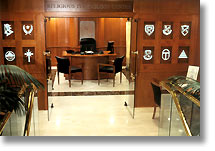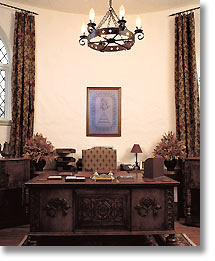guanoloco
As-Wased
The Board of Directors is suspiciously absent. There's no knowing anywhere who these members are or where they're at.
If one goes to the website of RTC one can read all about David Miscavige and that's it. Here's the site map url: https://www.rtc.org/sitemap.html
If you go there nowhere will you be able to locate the Board of Directors or see who they are - although you can select "contact" and then see all the MEST offices of RTC sans any people or "terminals" as we like to call them.
And then, of course, you can read all about Miscavige and this here quote: "In 1987, Mr. David Miscavige became the Chairman of the Board of Religious Technology Center." That's roughly 30 years as the Board Chair and that's weird...as in waaaaaaaaaaaaay too long by any standards anywhere.
Here's 20 Questions About Boards in which this comment is made:
And here's an argument from 5 Reasons Board Leaders Should Have Term Limits.
But then, we are talking about a non-profit board so let's look at this for commentary: A Nonprofit's Board of Directors - What is a Board?
So then I looked up the Top 100 Non Profits just to look at their websites and see if I could find their Board of Directors - of which there would be a member who was the Chairman of the Board holding the Chair.
I just went to the website of the first 5 on this list and in every case with a few clicks I was introduced to the Board and there was no "shows" of MEST offices or anything spiritual like that.
http://www.unicef.org/about/execboard/
https://www.hrw.org/about/people/board-directors
http://www.moma.org/about/trustees
http://www.hrc.org/hrc-story/boards
https://www.dosomething.org/us/about/board
Every one of these non-profits, so far, broadly disseminate when the next Board meeting is scheduled. Scientology doesn't do that.
Why does Scientology not have a Board? Where are the Directors? Who cares about the MEST offices? Why would there be a focus on those?

RTC Int

RTC CC

RTC ASHO

RTC AOLA

RTC FLB

RTC Sand Castle

RTC SH

RTC Denmark

RTC AOSH ANZO

RTC Flagship
On every single website of these various Scientology joints you can read all about Miscavige. YAWN!
What organization would parade a bunch of posh and empty offices? How spiritual is that? LOOK AT OUR MEST!!! WE HAVE MEST!!!
If one goes to the website of RTC one can read all about David Miscavige and that's it. Here's the site map url: https://www.rtc.org/sitemap.html
If you go there nowhere will you be able to locate the Board of Directors or see who they are - although you can select "contact" and then see all the MEST offices of RTC sans any people or "terminals" as we like to call them.
And then, of course, you can read all about Miscavige and this here quote: "In 1987, Mr. David Miscavige became the Chairman of the Board of Religious Technology Center." That's roughly 30 years as the Board Chair and that's weird...as in waaaaaaaaaaaaay too long by any standards anywhere.
Here's 20 Questions About Boards in which this comment is made:
18. Do boards have term or age limits?
Some boards have term limits and age limits and others do not. The National Association of Corporate Directors recommends term limits of 10 to 15 years to promote turnover and obtain fresh ideas. Age limits range from 70 to 80 years old, and many companies have no limit at all. Without term or age limits it is often difficult for companies to suggest to board members that they retire or leave.
Some boards have term limits and age limits and others do not. The National Association of Corporate Directors recommends term limits of 10 to 15 years to promote turnover and obtain fresh ideas. Age limits range from 70 to 80 years old, and many companies have no limit at all. Without term or age limits it is often difficult for companies to suggest to board members that they retire or leave.
And here's an argument from 5 Reasons Board Leaders Should Have Term Limits.
1. See above. Term limits provide a painless way for people who aren't doing a good job to retire gracefully and automatically. Admittedly, this is a pragmatic argument—and the downside is that a chair who is doing a fantastic job may get forced out early. But I've never heard a real-life complaint about term limits. And I've heard many complaints about their absence.
2. Term limits help with recruitment. Serving as a board chair requires an intensive commitment of time and energy. Prospective chairs are more likely to agree to serve if they know the office has an expiration date.
3. Term limits force organizations to develop new leaders. Boards that know they'll need a new chair every few years are more likely to recruit new members with an eye toward future leadership roles. And board candidates who want to build their own leadership skills will be more likely to say yes if they know there are opportunities to lead.
4. Term limits help with fund raising. A board chair is potentially one of an organization's most powerful volunteer fund raisers. But chairs who serve for many years may exhaust their Rolodexes and grow tired of making the ask. Leadership transitions provide an opportunity to engage new prospects who have relationships with the new leader.
5. Term limits lead to healthier boards. Admittedly, this is a catch-all intended to cover three or four other good arguments—because five is a nice round number. Board chair term limits reduce the likelihood that a few individuals will dominate board discussions and decisions. They provide periodic injections of new energy and ideas. And they help prevent board-chair burnout.
2. Term limits help with recruitment. Serving as a board chair requires an intensive commitment of time and energy. Prospective chairs are more likely to agree to serve if they know the office has an expiration date.
3. Term limits force organizations to develop new leaders. Boards that know they'll need a new chair every few years are more likely to recruit new members with an eye toward future leadership roles. And board candidates who want to build their own leadership skills will be more likely to say yes if they know there are opportunities to lead.
4. Term limits help with fund raising. A board chair is potentially one of an organization's most powerful volunteer fund raisers. But chairs who serve for many years may exhaust their Rolodexes and grow tired of making the ask. Leadership transitions provide an opportunity to engage new prospects who have relationships with the new leader.
5. Term limits lead to healthier boards. Admittedly, this is a catch-all intended to cover three or four other good arguments—because five is a nice round number. Board chair term limits reduce the likelihood that a few individuals will dominate board discussions and decisions. They provide periodic injections of new energy and ideas. And they help prevent board-chair burnout.
But then, we are talking about a non-profit board so let's look at this for commentary: A Nonprofit's Board of Directors - What is a Board?
The board of directors is the governing body of a nonprofit. Individuals who sit on the board are responsible for overseeing the organization’s activities. Board members meet periodically to discuss and vote on the affairs of the organization. At a minimum, an annual meeting must occur with all board members present. Additional meetings are likely to take place throughout the year so board members can discuss and make other necessary decisions. Board memberships are not set up to be permanent positions; most organizations have terms set up for board members, which typically fall between two and five years.
So then I looked up the Top 100 Non Profits just to look at their websites and see if I could find their Board of Directors - of which there would be a member who was the Chairman of the Board holding the Chair.
I just went to the website of the first 5 on this list and in every case with a few clicks I was introduced to the Board and there was no "shows" of MEST offices or anything spiritual like that.
http://www.unicef.org/about/execboard/
https://www.hrw.org/about/people/board-directors
http://www.moma.org/about/trustees
http://www.hrc.org/hrc-story/boards
https://www.dosomething.org/us/about/board
Every one of these non-profits, so far, broadly disseminate when the next Board meeting is scheduled. Scientology doesn't do that.
Why does Scientology not have a Board? Where are the Directors? Who cares about the MEST offices? Why would there be a focus on those?

RTC Int

RTC CC

RTC ASHO

RTC AOLA

RTC FLB

RTC Sand Castle

RTC SH

RTC Denmark

RTC AOSH ANZO

RTC Flagship
On every single website of these various Scientology joints you can read all about Miscavige. YAWN!
What organization would parade a bunch of posh and empty offices? How spiritual is that? LOOK AT OUR MEST!!! WE HAVE MEST!!!
Board of Directors?

We don't need no stinkin' Board of Directors!

We don't need no stinkin' Board of Directors!


